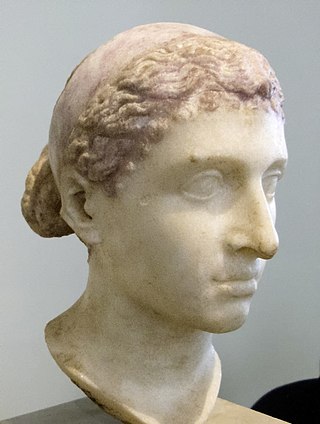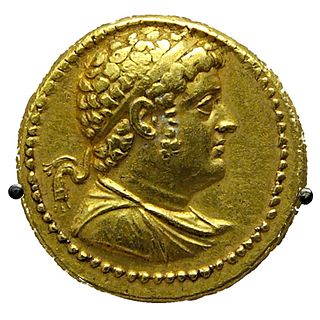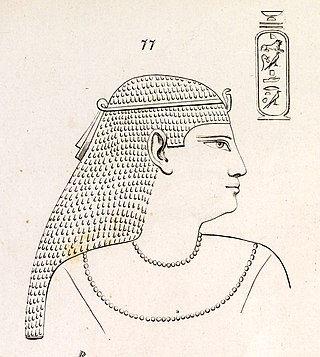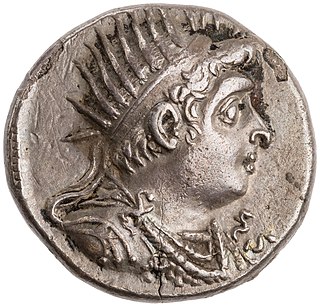Related Research Articles

Alexandria is the second largest city in Egypt, and the largest city on the Mediterranean coast. Founded in c. 331 BC by Alexander the Great, Alexandria grew rapidly and became a major centre of Hellenic civilisation, eventually replacing Memphis, in present-day Greater Cairo, as Egypt's capital. Called the "Bride of the Mediterranean" internationally, Alexandria is a popular tourist destination and an important industrial centre due to its natural gas and oil pipelines from Suez.

The Great Library of Alexandria in Alexandria, Egypt, was one of the largest and most significant libraries of the ancient world. The library was part of a larger research institution called the Mouseion, which was dedicated to the Muses, the nine goddesses of the arts. The idea of a universal library in Alexandria may have been proposed by Demetrius of Phalerum, an exiled Athenian statesman living in Alexandria, to Ptolemy I Soter, who may have established plans for the Library, but the Library itself was probably not built until the reign of his son Ptolemy II Philadelphus. The Library quickly acquired many papyrus scrolls, owing largely to the Ptolemaic kings' aggressive and well-funded policies for procuring texts. It is unknown precisely how many scrolls were housed at any given time, but estimates range from 40,000 to 400,000 at its height.

Polybius was a Greek historian of the middle Hellenistic period. He is noted for his work The Histories, a universal history documenting the rise of Rome in the Mediterranean in the third and second centuries BC. It covered the period of 264–146 BC, recording in detail events in Italy, Iberia, Greece, Macedonia, Syria, Egypt and Africa, and documented the Punic Wars and Macedonian Wars among many others.

Cleopatra VII Thea Philopator was Queen of the Ptolemaic Kingdom of Egypt from 51 to 30 BC, and its last active ruler. A member of the Ptolemaic dynasty, she was a descendant of its founder Ptolemy I Soter, a Macedonian Greek general and companion of Alexander the Great. After the death of Cleopatra, Egypt became a province of the Roman Empire, marking the end of the last Hellenistic period state in the Mediterranean and of the age that had lasted since the reign of Alexander. Her first language was Koine Greek and she is the only known Ptolemaic ruler to learn the Egyptian language.

Tyche was the presiding tutelary deity who governed the fortune and prosperity of a city, its destiny. In Classical Greek mythology, she is usually the daughter of the Titans Tethys and Oceanus, or sometimes Zeus, and at this time served to bring positive messages to people, relating to external events outside their control.

Ptolemy IV Philopator was the fourth pharaoh of Ptolemaic Egypt from 221 to 204 BC.

Ptolemy V Epiphanes Eucharistos was the King of Ptolemaic Egypt from July or August 204 BC until his death in 180 BC.

Cleopatra I Syra was a princess of the Seleucid Empire, Queen of Ptolemaic Egypt by marriage to Ptolemy V of Egypt, and regent of Egypt during the minority of their son, Ptolemy VI, from her husband's death in 180 BC until her own death in 176 BC.

Ptolemy VI Philometor was a Greek king of Ptolemaic Egypt who reigned from 180 to 164 BC and from 163 to 145 BC. He is often considered the last ruler of ancient Egypt when that state was still a major power.

Antiochus IV Epiphanes was a Greek Hellenistic king who ruled the Seleucid Empire from 175 BC until his death in 164 BC. He was a son of King Antiochus III the Great. Originally named Mithradates, he assumed the name Antiochus after he ascended the throne. Notable events during Antiochus's reign include his near-conquest of Ptolemaic Egypt, his persecution of the Jews of Judea and Samaria, and the rebellion of the Jewish Maccabees.

Ptolemy VIII Euergetes II Tryphon, nicknamed Physcon, was a king of the Ptolemaic dynasty in Egypt. He was the younger son of King Ptolemy V and Queen Cleopatra I. His reign was characterised by fierce political and military conflict with his older siblings, Ptolemy VI and Cleopatra II.

Pelusium was an important city in the eastern extremes of Egypt's Nile Delta, 30 km to the southeast of the modern Port Said. It became a Roman provincial capital and Metropolitan archbishopric and remained a multiple Catholic titular see and an Eastern Orthodox active archdiocese.

Sosibius was the chief minister of Ptolemy IV Philopator, king of Egypt. Nothing is known of his origin or parentage, though he may have been a son of Sosibius of Tarentum; nor is there any account of how he rose to power. He is first attested immediately after the accession of Ptolemy IV in 221 BC, exercising great influence over the 22-year old king alongside Agathocles, the brother of Ptolemy IV's mistress Agathoclea. He remained a major force throughout the reign and helped ensure the smooth succession of Ptolemy V Epiphanes in 204 BC. After that he disappears from the record.
Theodotus was an Aetolian general, who at the accession of the Seleucid monarch, Antiochus III the Great, held the command of the important province of Coele-Syria for Ptolemy Philopator, king of Egypt.
The Alexandrian school is a collective designation for certain tendencies in literature, philosophy, medicine, and the sciences that developed in the Hellenistic cultural center of Alexandria, Egypt during the Hellenistic and Roman periods.

The Ptolemaic Kingdom or Ptolemaic Empire was an Ancient Greek state based in Egypt during the Hellenistic period. It was founded in 305 BC by Ptolemy I Soter, a companion of Alexander the Great, and ruled by the Ptolemaic dynasty until the death of Cleopatra VII in 30 BC. Reigning for nearly three centuries, the Ptolemies were the longest and final dynasty of ancient Egypt heralding a distinctly new era for religious syncretism and the blending of a new Greco-Egyptian culture.
Agathoclea was the favourite mistress of the Greco-Egyptian Pharaoh Ptolemy IV Philopator who reigned 221–205; sister of Ptolemy IV’s minister Agathocles.
Scopas was an Aetolian general, who served both his native Aetolian League in the Social War and Ptolemaic Egypt against the Seleucids, with mixed success. He was executed in 196 BC at Alexandria for conspiring to seize the power of the realm for himself.
Polycrates of Argos, son of Mnasiades, was a Ptolemaic commander at the Battle of Raphia, as well as a governor of Cyprus and chancellor of the Ptolemaic Kingdom in the late third and early second centuries BC.
Damalis was a coastal town of ancient Bithynia located on the Bosphorus near Chrysopolis. Polybius calls the town Bus or Bous.
References
- ↑ Kapparis, Konstantinos (2017-10-23). Prostitution in the Ancient Greek World. Walter de Gruyter GmbH & Co KG. ISBN 978-3-11-055795-4.
- ↑ Polybius, 14.11
- ↑ Athenaeus, 13.576